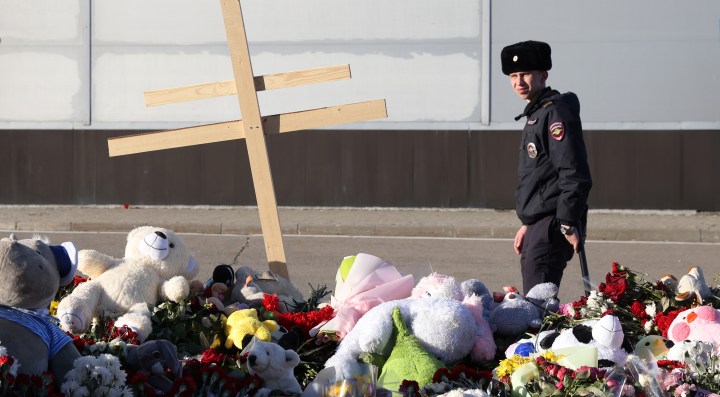UKRAINE UPDATE: 2 APRIL 2024
Moscow weighs up tighter immigration laws after terror attack; Russia’s economy picks up in early 2024

Russia is considering a raft of changes to tighten its immigration laws after Tajik nationals were accused of carrying out the worst atrocity in the capital in more than two decades.
Russia’s economy accelerated at the start of the year on the back of strong consumer demand, investment and exports, as the country continued to weather the impact of sanctions following the invasion of Ukraine.
Russia plans to reduce daily diesel exports from key western ports in April to the lowest in five months after Ukrainian drone attacks on refineries and seasonal maintenance sharply lowered crude processing rates.
Russia hit energy facilities in Ukraine’s south and the far west on Sunday as it continued almost daily drone and missile barrages, local authorities said.
Russia weighs tighter migrant worker rules after Moscow attack
Russia is considering a raft of changes to tighten its immigration laws after Tajik nationals were accused of carrying out the worst atrocity in the capital in more than two decades.
The attack on concertgoers at Crocus City Hall in the Moscow suburbs last month killed more than 140 people. Investigators later found that some of the alleged attackers had expired Russian immigration documents.
Russian authorities had since intensified scrutiny of the legal status of migrant workers across the country, while police had raided facilities run by companies that traditionally employed immigrants, raising concern about a crackdown on citizens of Central Asian countries, according to media reports. More than 20 people were detained after a raid on a warehouse run by online marketplace Wildberries, according to Gazeta.ru.
The Interior Affairs Ministry last week filed a draft law to tighten migration rules, spokesperson Irina Volk said on Monday. Under that bill, foreign workers would need to have a so-called digital profile with biometric data. The number of days that foreigners can spend in Russia without registering with authorities would be cut to 90 days per calendar year from 90 days within a six-month period currently.
Officials may also create a special government body to manage migrant affairs that will be overseen by the president, Vedomosti newspaper reported, citing several people familiar with the situation. Kremlin spokesperson Dmitry Peskov said on Monday that no decisions had been made yet, according to the state-run Tass news service.
The speaker of Russia’s lower house of parliament, Vyacheslav Volodin, has created a working group to analyse changes to migration policy, Tass reported. Vladislav Davankov, the deputy chairman of the lower chamber and a presidential candidate in last month’s election, proposed toughening Russia’s migration law “for security reasons”.
“Entering our country is too easy not only for those who want to work here in good faith, but also for people that want outright evil,” Davankov said on his Telegram channel. Russia needed to impose “deportation for even the smallest violation of law”.
The crackdown on migrants is happening as Russia is facing a labour shortage that is hitting businesses from taxi services and metal refineries to posh Moscow restaurants. Russia needed a record 2.3 million more workers, the Federal Statistics Service reported at the end of December. At the same time, Russia’s unemployment has plunged to a historic low of 2.9%. In December, President Vladimir Putin said about 10 million migrants were working in Russia.
Russia’s economy picks up in early 2024
Russia’s economy accelerated at the start of the year on the back of strong consumer demand, investment and exports, as the country continued to weather the impact of sanctions following the invasion of Ukraine.
Despite signs that growth was slowing at the end of last year, the economy picked up in the early months of 2024, according to a Monday statement by the Bank of Russia summarising its decision to hold rates at last month’s meeting.
Rate-setters were particularly surprised by the resilience of consumers, supported by an increase in household incomes and borrowing, the minutes said. Savings among the population were also rising, bucking a tendency to decline at the start of the year.
That coincided with investment growth and a stable financial position among the country’s biggest companies, according to the central bank. Based on a survey in March, the bank’s business climate indicator was the healthiest of the past 12 years. Future production and demand expectations were at their highest level since May 2013, the central bank said.
The Bank of Russia kept interest rates unchanged at 16% last month, seeking to navigate inflation risks that now include attacks on regions bordering Ukraine. The bank gave no guidance on the likely direction of its next move, saying, “Tight monetary conditions will be maintained in the economy for a long period.”
Read More: Russia holds rate as attacks by Ukraine spur inflation risks
The central bank highlighted recent growth in commodity prices and exports, a key source of revenue for the Kremlin as it faces war expenses and social spending.
Russia plans to cut April seaborne diesel exports to five-month low
Russia plans to reduce daily diesel exports from key western ports in April to the lowest in five months, after Ukrainian drone attacks on refineries and seasonal maintenance sharply lowered crude processing rates.
Diesel loadings from the nation’s three major ports on the Black and Baltic seas, including some volumes originating in Belarus, are set to fall to around 2.29 million tonnes this month, according to industry data seen by Bloomberg.
That equates to just over 569,000 barrels a day, down by 21% compared with actual daily exports of about 724,000 barrels from the same ports in March, calculations based on data from intelligence firm Kpler show.
Russia is cutting seaborne diesel supplies after weekly crude-processing rates dropped to a 10-month low following the Ukrainian drone attacks as the war between the two nations entered its third year. Seasonal maintenance that is set to last into summer, temporarily reducing crude throughput at some Russian refineries further down, is also putting pressure on the nation’s diesel flows.
Russia fires new drone barrage at Ukraine energy facilities
Russia hit energy facilities in Ukraine’s south and the far west on Sunday as it continued almost daily drone and missile barrages, local authorities said.
Kremlin forces damaged high-voltage electricity substations in the Odesa region, causing power to be cut off to more than 170,000 households in Ukraine’s third-largest city, according to the electricity provider DTEK.
Electricity had been partially restored, helped by solar and wind power, yet the situation remained difficult and public transport powered by electricity has been halted.
Ukraine’s state-run energy company Naftogaz said its assets were again attacked by Russia overnight, with specialists fixing the damage.
Electricity supplies were limited again in Ukraine’s second-largest city of Kharkiv, the energy ministry said in an emailed statement.
“Power companies are forced to renew hourly blackout schedules,” the ministry said. “This is due to the unreliability of the electricity transmission system after large-scale enemy attacks, as well as the insufficiency of local generation due to the destruction of power plants.”
In the Lviv region, not far from Ukraine’s border with Poland, Russia targeted critical infrastructure for the third time since 24 March, destroying an administrative building and killing at least one person, Maksym Kozytskyi, the head of the region, said on Telegram.
Ukraine shot down nine cruise missiles out of 14 directed at it overnight, as well as nine of 11 drones, air defence forces said. Russia also fired a ballistic missile and a guided aviation rocket, the forces said.
Russia’s defence ministry confirmed in a statement carried by the RIA news agency that it had carried out strikes on energy infrastructure and gas production facilities in Ukraine, as well as several defence industry targets. DM



















Comments - Please login in order to comment.